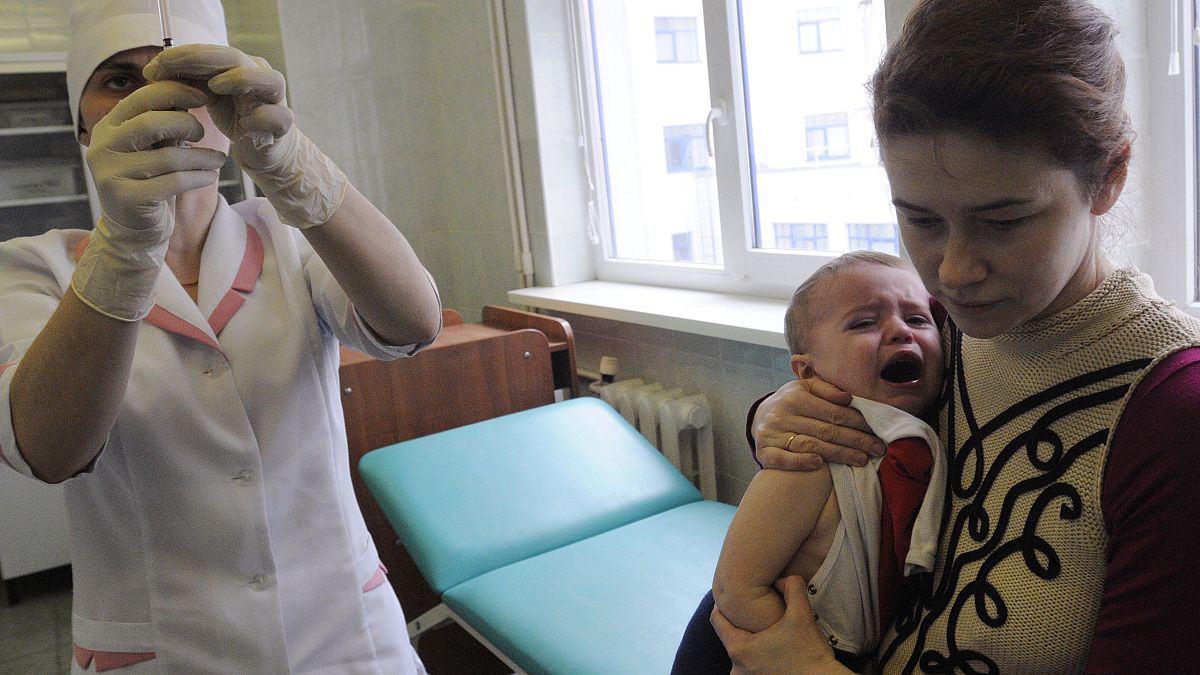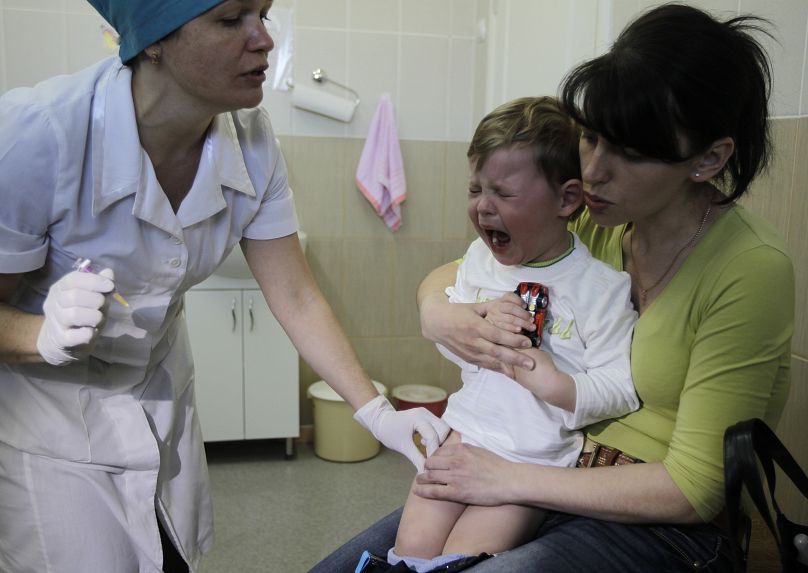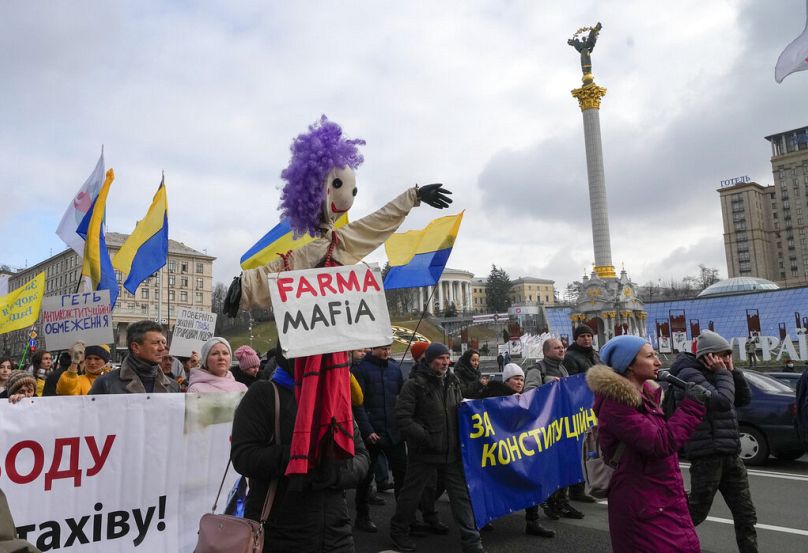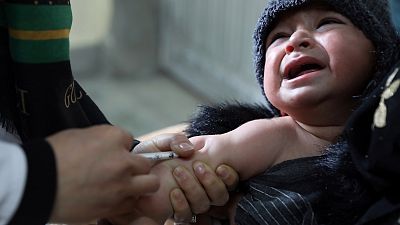Pre-war, Ukraine's immunisation rates were already low due to persistent vaccine scepticism. Combined with the disruption caused by the ongoing invasion, a new measles outbreak is possible this year.
Health experts are concerned that a new measles outbreak could occur in the war-torn country if hundreds of thousands of unvaccinated school-aged children return to school in September.
“The Ministry of Health of Ukraine and the centres for immunisation constantly monitor the contagion risks, and the highest risk we face in the country right now is a measles outbreak,” Ihor Kuzin, the Deputy Minister of Health of Ukraine, told reporters in Kyiv earlier this week.
Ukraine has been a measles hotspot on the continent in the past, with vaccine scepticism and supply interruptions leading to a large outbreak in 2019.
“The first measles explosion in Ukraine happened over the 2017-2019 period and was a massive outbreak that the government was trying to mitigate. Around 115,000 children contracted the disease at the time,” Kuzin continued.
According to the Ministry of Health, only 74% of 1-year-old children and 69% of 6-year-olds received their first and second measles vaccination, respectively, in 2022.
Those children, plus others who have missed their regularly scheduled vaccinations between the age of 2 and 17, will be headed towards classrooms where the risk of contagion is much higher.
“Around 260,000 children need to be vaccinated, and until that is done we are facing the risk of a massive outbreak,” explained Kuzin, highlighting that this number refers to those who skipped jabs on their regular vaccine calendar.
Measles is a highly contagious airborne disease spread by respiratory droplets, with complications including pneumonia and brain inflammation. It is also almost entirely vaccine preventable.
“So until 1 September, when school starts, these children need to get vaccinated,” Kuzin concluded, urging people to get vaccinated in the next month and a half.
Vaccination difficulties due to the invasion
The World Health Organization (WHO) has said that Ukraine has become more vulnerable to contagious diseases after the launch of the full-scale invasion of Ukraine in February 2022.
The crowding of people in bomb shelters, along borders and other areas, as well as vaccination schedules not being met, makes it easier for viruses that thrive from hopping from one host to another in quick succession.
“When the Russian invasion of Ukraine began, we realised that the biggest health risks in the country were diphtheria and measles outbreaks. The important thing right now, in order to control the scale of the outbreak, is to vaccinate the unvaccinated children who are in the country,” said Vusala Allahverdiyeva, an expert on Disease Prevention And Immunisation at the WHO.
While many children were initially pulled out of school when the invasion was launched and were taught via online classes, certain parts of the country where the intensity of the fighting is lower are likely to go back to in-person classes, as Ukraine learns to adapt to life under invasion.
The Ministry of Health, with the assistance of UNICEF, will also be operating with mobile vaccination teams in the upcoming months to reach those who have had to move away from their cities or towns due to the invasion.
Around 318 mobile teams will be providing jabs for internally displaced people in every region of the country.
Andrii Pashynnyi, in charge of immunisation at the ministry, has urged Ukrainians to ignore vaccine naysayers at this crucial juncture.
“If your doctor says you should not get vaccinated, you should change your doctor. We urge everyone to get vaccinated,” said Pashynnyi.
In addition to unvaccinated children being a risk to those currently in Ukraine, it is not unlikely that unvaccinated Ukrainian refugee children in the EU will also be at a higher risk of contracting and spreading measles and other infectious diseases.
‘Disinformation and fake certificates’
In 2008, a fake news story about a young man dying from bacterial meningitis after he received a measles vaccine led to the Ministry of Health halting vaccination and many Ukrainians deciding not to immunise their children, despite objections from the WHO.
According to reports, this led to a significant drop in public confidence in vaccinations, and the level of measles vaccinations among young children went down from over 90% in the 2008-2010 period to only 40% by 2010.
Experts have insisted that a 95% vaccination rate is needed in the general population to effectively prevent any measles cases.
“Every five years, there is a major measles outbreak in Ukraine. People do not take it seriously because the general European statistic is that one in 1,000 people die from measles, but it’s a dangerous and very infectious disease,” explained Fedir Lapii, Head of the National Technical Group of Experts on Immunisation.
In 2019, Euronews reported on the increase of mothers in Ukraine choosing to bribe their doctors into issuing fake vaccination certificates, rather than having their young children be immunised.
Vaccine disinformation is widespread on a global level, and was acutely registered at the peak of the COVID-19 pandemic when many refused the life-saving shot.
“Given the fact that the country is facing Russian aggression, we should not give measles or any other disease the chance to weaken us. Please do not contract a disease that is easily preventable,” Lapii urged.
Ukrainian authorities have indicated that due to suspicions over the efficacy of vaccines sourced from India – which the WHO insists are unfounded – they purchased a batch of entirely European-made vaccines to prevent anyone from being dissuaded from immunisation.





